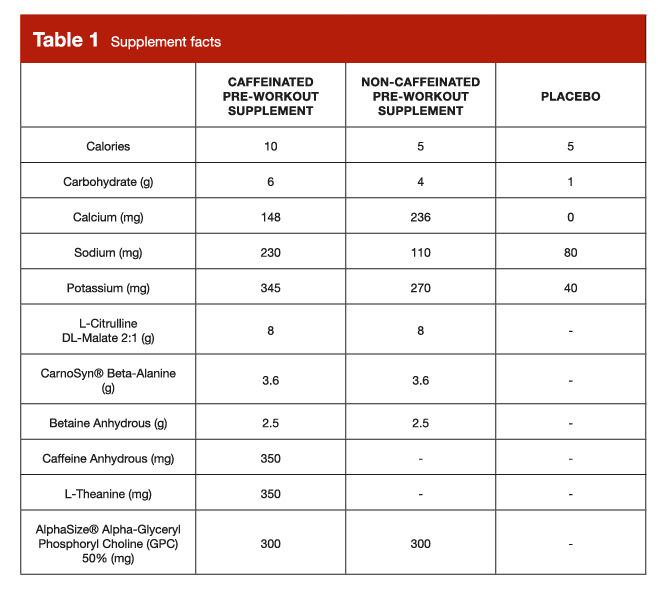
Research Review Shorts: Pre-Workout or Expensive Caffeine?
There is evidence showing pre-workout supplements have positive effects on training outcomes. But are these positive effects simply coming from the large caffeine bolus, creatine content, or other ingredient? Do we really need to spend our money on pre-workout supplements or should we just refine our supplement selection to include the actual prime movers?
Overview
Pre-workout supplements are one of the most commonly used supplements by lifters. There actually is some data to back up their use as they have been shown to enhance acute performance as well as enhance training adaptations over time.
One must ask however, which ingredients are actually causing the positive outcomes? Which ingredients aren’t contributing? Which ingredients can be counteracting one another?
In the presently reviewed study, researchers compared the effects of three different experimental treatments (a caffeinated pre-workout supplement, a non-caffeinated pre-workout supplement, or a placebo) on exercise performance. The following table shows a list of ingredients.

24 healthy, college-aged, resistance-trained participants were used in the study. The experimental beverages were ingested 30 minutes prior to the onset of exercise.
Performance outcomes included isometric and isokinetic squat performance, bench press and leg press 1RM, bench press and leg press repetitions to fatigue, and subjective ratings of energy, fatigue, and focus.
Findings
- Pre-workout supplementation, with or without caffeine, increased maximal isometric squat force, and may have improved early rate of force development (particularly in female participants).
- Neither of the pre-workout supplements significantly improved bench press, leg press, or isokinetic squat performance.
- The caffeinated pre-workout supplement led to increased ratings of subjective energy, but this was not observed when participants consumed the non-caffeinated pre-workout supplement or the placebo treatment.
Interpretation & Takeaways
The findings of this study were a bit mixed. If you focus on subjective energy outcomes, you might think caffeinated pre-workout is best. If you focus ono the isometric squat outcomes, you could conclude that non-caffeinate pro-workout supplementation is just effective as caffeinated pre-workouts.
Because this was a small-sample performance study, it becomes hard to draw conclusions. Human performance, even in the best of conditions, is not perfectly reproducible from day to day.
What we can say is that the presently reviewed study paints a very underwhelming picture for caffeine’s effects on physical performance (in spite of the overall body of literature painting a more favorable picture).
The isometric squat findings also suggest that pre-workout formulas may have some ergogenic potential independent of their caffeine content, given that both caffeinated and non-caffeinated beverages improved performance of this task. We can assume another ingredient is driving ergogenic effects (most likely the citrulline malate in this supplement)
All-in-all pre-workouts can have a place in one’s supplement cabinet. The efficacy of any particular formula will depend on its ingredients and their dosages.
Caffeine, citrulline, dietary nitrate, creatine, betaine and beta-alanine have all been shown to potentially have some ergogenic potential. Instead of purchasing pre-workouts you could experiment with these substances on your own to find which truly help you and which do not.
Personally, I don’t like taking pre-workouts. I would rather ingest some caffeine only when I need it (coffee generally) and use creatine and citrulline for some assistance in my training.
References
https://www.tandfonline.com/doi/full/10.1080/15502783.2022.2060048?src=